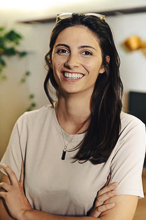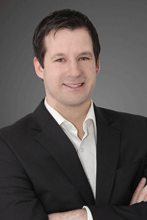Victoria Paster
2018 | Master Media Technology

Career Development
I completed my Master's degree in Media Technology at THD in autumn 2018. I wrote my thesis on search engine optimisation (SEO) for JavaScript-based websites at the online agency Diva-e. After travelling to Asia, I continued to work there as an SEO consultant. Which I still love doing, but preferably for a slightly different target group.
That's why I started my own business, SEO4Good, in 2021. I now work with companies that sell sustainable products in their online shop and have too few orders. I help these e-commerce companies to become visible on the internet and get enough orders.
Reminiscing allowed: remember your student days
I have fond memories of the THD. Above all, I liked the fact that I was able to try out a lot of things there. Whether in the courses, the electives or in my part-time job in the STEM team. Thanks to the small course sizes and the strong support from fellow students, professors and university staff, I was able to settle in quickly and learn a lot of new things. The fact that I had previously completed my Bachelor's degree at another university - the University of Applied Sciences Upper Austria - was not a problem. Although my degree there did not fulfil the required number of ECTS credits for the Master's degree, I was able to make up the missing credits easily with an internship and the required PLVs.
What advice would you give to today's students?
Use your studies to try out different things and stay curious.
Friedrich Münch
2011 | Media Technology

Career Development
I grew up in the district of Deggendorf - more precisely in Winzer and in Hengersberg - and came here from Niederalteich primary and secondary school, via Schöllnach secondary school and the FOS in Deggendorf to the Deggendorf Institute of Technology. Fortunately, I was one of the last students to start my studies in the diploma programme Media Technology and fortunately I also had the option to continue my studies seamlessly in Deggendorf as one of the first students in the Master's programme Media Technology and Production.
During my studies, I always had the goal of entering the professional world in the film-video field - e.g. as a video journalist. But as is so often the case, things turn out differently than planned. I started my career in the university world at the Deggendorf Institute of Technology via a part-time job during my studies at DIT. I was able to gain my first professional experience in the university administration in the area of studies and teaching. Most recently, I was responsible for setting up the central facilities for teaching and learning at the newly founded European Campus Rottal-Inn in Pfarrkirchen. Just as a side note: I used my part-time job at the university to develop a media and marketing concept for the Deggendorf Institute of Technology in my Master's thesis. After six years at DIT, however, it was time to get to know something new. Even though I lost a lot of dear colleagues in the process. Fortunately, I am still in close contact with many of the DIT staff - whom I would like to greet warmly at this point.
In the next chapter, I was allowed to accompany the development of the TUM Campus Straubing for Biotechnology and Sustainability of the Technical University of Munich from the beginning in Straubing as a consultant for web design and marketing on the "green field". In addition to a web relaunch, I was responsible for student marketing, press and public relations, event management and web design at TUMCS.
For personal reasons, I then moved to Nuremberg. Professionally, I moved to the Catholic University of Eichstätt-Ingolstadt as a marketing officer and was responsible for the marketing of the Ingolstadt School of Management.
While working, I continued my education with an MBA in Business Management at the Friedrich-Alexander University of Erlangen-Nuremberg, primarily to gain in-depth specialist knowledge in the field of management.
Not planned and by chance, I got the opportunity to manage and organise a constituency office of a member of the Bundestag as a research assistant in the German Bundestag at the beginning of 2022. Specifically, I take care of the organisation of appointments, the preparation and follow-up of appointments with citizens, companies, institutes or associations. I deal with concerns from the constituency and answer enquiries on a wide range of topics. This also includes press and public relations work, event management, writing speeches and speech texts or producing photos and videos for the social media channels of the Member of the Bundestag.
Reminiscing allowed: remember your student days
In addition to the excellent teaching and practical training, I particularly like to think back on the time spent alongside my studies. Compared to Nuremberg, Deggendorf is rather a small town, which I actually find optimal for a Bachelor's programme. This means that students always meet each other on campus or in the city. Everyone knows everyone. When I think of the parties at Yusuf or the 2006 World Cup in Germany.... That was a really great time, especially since beer still cost a good two euros back then :D. I was able to gather so many different experiences during my studies, I was able to try things out during my studies and I still benefit from the network I gained today. It was a really nice time at the campus on the beautiful blue Danube.
What advice would you give to today's students?
As a passionate former student advisor, I can only recommend one thing to you: You need a common thread or a goal, motivation, diligence, patience, stamina and you should always be open to new things. Try things out, sometimes go left, sometimes right, or even shift down a gear, but always keep your eyes firmly on the goal.
Looking back, I think it's a shame that there weren't so many options for international exchange programmes, for example, when I was a student. By the end of my studies and especially through my professional activities at the universities, I was able to build up an international network. The intercultural exchange, a new language, alone for a longer time abroad and without parents - these are experiences for life. That's why I encourage everyone to invest one or even two semesters in a semester abroad during their studies. Nowadays, there are so many programmes and funding opportunities for a stay abroad. Take advantage of this unique opportunity. Normally, you will never again have the opportunity to study abroad for so long and so "cheaply". And some people have found the love of their lives through this. That's why I've been commuting back and forth between Germany and Brazil regularly for a few years now.







